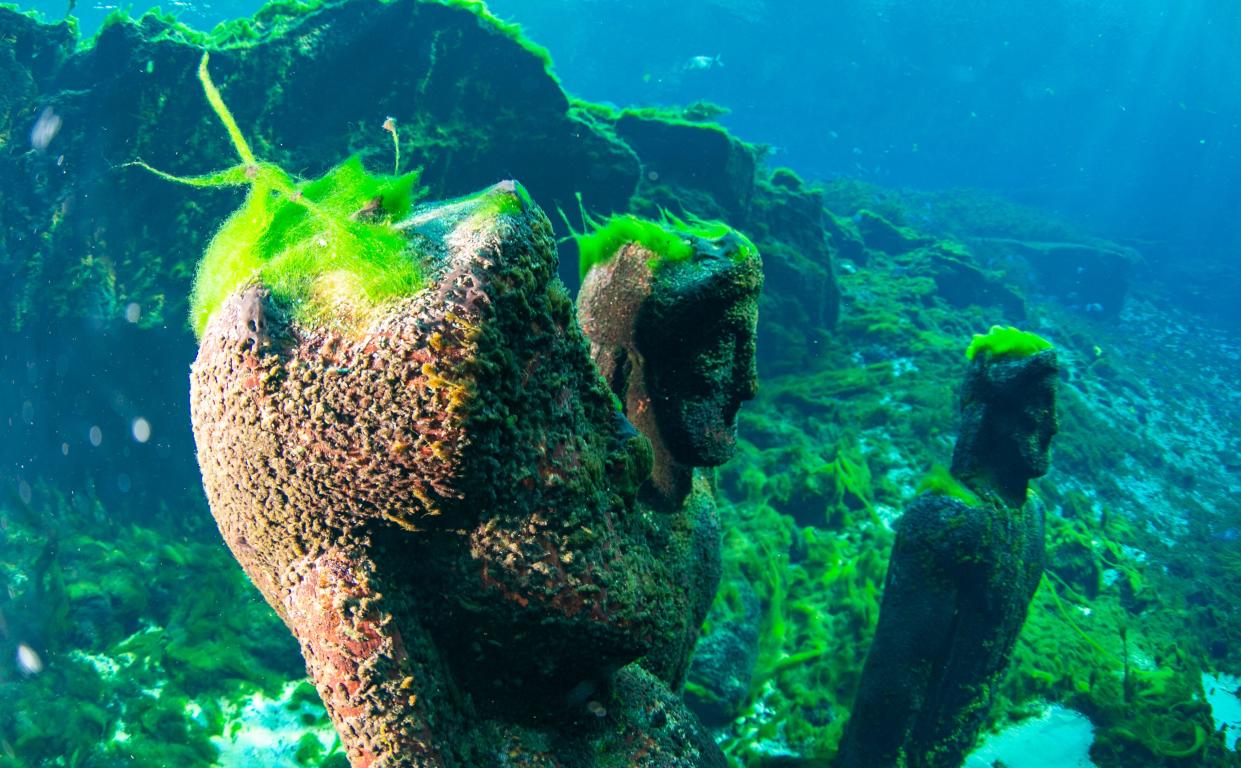'Saving Florida Springs' provides remedies for problems ailing springs

Albertus Vogt, aka “The Duke of Dunnellon,” was quite the flamboyant Floridian for the 1880s.
He made his money in phosphate mining and he liked to flaunt it. A favorite amusement was dropping gold coins into Silver Springs.
He liked the way the coins seemed to grow in size in the crystalline water.
Don’t try that stunt today, boys and girls.
There’s little magnifying effect in murky water. And those glittering coins would disappear amid the brown, drab algae that coats everything below the surface.
I thought about Vogt while reading Robert L. Knight’s new book, “Saving Florida Springs.” Due to declining water flows and nutrient poisoning, Knight, executive director of the Howard T. Odum Florida Springs Institute, writes, “many of Florida’s favorite springs have seen their native vegetation replaced by filamentous algae, their former clarity lost to murkiness, and their damaged health evidenced by declining fish and wildlife populations.”
More from Ron Cunningham:
What would former UF presidents have done in controversy over censored professors?
Finding a new use for school district's headquarters would help revitalize downtown
Gainesville will regret it if we don’t two-lane University Avenue
Listen, I called “Saving Florida Springs” a book. It’s not.
It’s an owner's manual. And it is sorely overdue.
Because to the extent that we Floridians collectively own these wondrous springs we are terrible stewards of our most precious natural resource.
Florida’s springs are sick. And we owners are the cause of the disease when we should be the cure.
But the springs are not yet terminal.
As Knight puts it, “a bright future for Florida’s springs is as simple as swallowing a pill. A healthy springs pill will counteract the greed and corruption that have spread like a cancer in the Sunshine State.
“This pill attacks Florida’s environmental cancer directly by modifying the mutated cancer cells that allow private businesses and their politicians to violate the Public Trust Doctrine for their personal financial gain.”
His optimism aside, there is no easy swallow to the pill — or pills — he has in mind.
Among the remedies listed in his owner's manual:
• Put all of Florida — from farms to factories to utilities to individuals — on a “water budget.”
• Stop pulling more water out of the ground than is sustainable.
• Create an “Aquifer Protection Fund,” by mandating a fee on all groundwater extractions.
• Discourage the use of more fertilizers, pesticides and other nitrogen-inducing chemicals than necessary by taxing them.
• Get cities to take less water out of the ground by requiring them to take more water out of rivers and reservoirs.
• Do everything possible to get more people off septic tanks and onto central sewage systems.
Few of his pills will go down easily and without substantial resistance from the agricultural, industrial and developmental lobbies that wield so much influence in Tallahassee.
Which raises another dilemma:
“When faced with a simplified decision about protecting or not protecting Florida’s environment, a super majority of individual Floridians will vote for a healthy environment,” he observes. “But many of those same individuals will vote for political representatives who consistently promote development at the expense of environmental protection.”
Case in point: What on earth convinced us to elect and re-elect Gov. Rick Scott … and then send him on to the U.S. Senate? Scott did everything in his power to cripple Florida’s water management districts and dismantle the state’s environmental protection apparatus.
Hence the most important pill in Knight’s pharmacology: To save the springs, we must convince Floridians to give a damn about them.
Listen,10 million of us get our drinking water directly from the same aquifer that nourishes the springs. So the toxics we’re pouring into the water eventually end up in our own bodies.
We have to stop being so ignorant and uncaring about the relationship between our own health and welfare and the fate of the springs.
That’s only going to happen with a lot of public awareness on multiple levels — in our schools, on our utility bills, in public service campaigns, on social media and more.
Instilling a “deeply held water ethic” may sound like a bridge too far, but Knight thinks we Floridians may finally be ready to confront the consequences of our collective neglect.
“With the year-to-year red tides and guacamole-thick cyanobacteria blooms in south Florida, the importance of wise water management finally gained some ground in the consciousness of Floridians,” he ventures.
Could red tide, green algae, toxic water and tons of dead fish and manatees be what finally convinces us to take our stewardship of all Florida waters seriously?
It’s sad that it has to come to that, but nothing else has worked so far.
Ron Cunningham is former editorial page editor of The Sun. Read his blog at www.floridavelocipede.com. Email him at ron@freegnv.com. This column is part of The Sun's Messages from the Springs Heartland series.

Join the conversation
Send a letter to the editor (up to 200 words) to letters@gainesville.com. Letters must include the writer's full name and city of residence. Additional guidelines for submitting letters and longer guest columns can be found at bit.ly/sunopinionguidelines.
Journalism matters. Your support matters.
Get a digital subscription to the Gainesville Sun. Includes must-see content on Gainesville.com and Gatorsports.com, breaking news and updates on all your devices, and access to the Gainesville.com ePaper. Visit www.gainesville.com/subscribenow to sign up.
This article originally appeared on The Gainesville Sun: Ron Cunningham: Robert Knight's book is an owner's manual for springs

